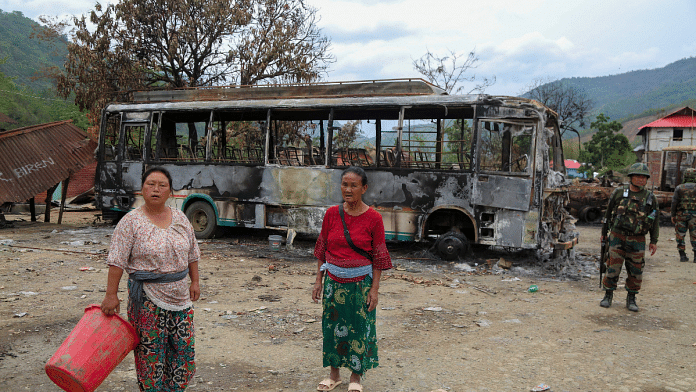Imphal: A little over two months after the Chief Minister N. Biren Singh-led Manipur government said it will pull out of a ceasefire pact — signed between the central government, state, and tribal insurgent groups — it continues to be in place and fully operational, Kuldiep Singh, security adviser to the chief minister, told ThePrint Thursday.
The tripartite “Suspension of Operations” (SoO), was signed on 22 August 2008, to initiate political dialogue with tribal insurgent groups operating in the state and to end hostilities and settle demands made by the state’s ethnic Kuki tribals for a separate homeland. In the pact, 25 Kuki insurgent groups were represented by two umbrella bodies — Kuki National Organization (KNO) and United People’s Front (UFO).
As part of the agreement, insurgents who came overground were put up in designated camps, called SoO camps. The camps are regularly inspected by security agencies, under the provisions of the agreement.
“SoO agreement is very much in place. We have started inspection of the SoO camps, as part of the agreement, following the violence that broke out in the state on 3 May [between the ethnic Kuki tribals and non-tribal or Meitei community],” Singh said.
The agreement mandates that as long as SoO is in place, security forces, be it central or state and insurgent groups will desist from launching any operation against each other. The insurgent groups, which are signatories of the pact, will also not undertake any activity that threatens the territorial integrity of the state.
However, in the aftermath of the 3 May ethnic clashes, the SoO agreement has come under a lot of strain. At a press conference, Friday, Singh claimed that during recent inspections at SoO camps by the security agencies, it was found that the agreement had been violated. Some of the insurgent cadres, as well as the arms and ammunition deposited inside the camps, were found missing.
Sources in the Manipur government told ThePrint that CM Biren Sigh had gone to Delhi on 13 March and met Union Home Minister Amit Shah to apprise him of the state cabinet’s decision to pull out of SoO, but it was not approved.
Senior officials in the Manipur government also told ThePrint that the trigger for the CM’s 10 March cabinet decision to pull out of SoO was a protest rally taken out by Kuki groups a couple of days before the decision, defying Section 144 of the CrPC (against unlawful assembly), invoked in some tribal districts.
The tribals were protesting an eviction drive being carried out by the government to clear reserved and protected forests from encroachers across hill districts.
“At this juncture, the central government does not want to take any step that jeopardises the ongoing peace talks with the militant groups,” a source told ThePrint.
A senior Manipur government home department official told ThePrint, that since SoO is a tripartite agreement, no stakeholder can pull out of it unilaterally.
“Even if the government wants to review [the agreement], it will discuss with all the parties concerned before taking a final call,” said the official, who did not want to be named.
Ahead of the 2022 assembly elections in Manipur, Amit Shah had said that if the BJP comes to power in the state, the party will resolve the Kuki issue. Following Shah’s announcement, Kuki groups — including KNO and UFO — had decided to support the BJP in the election. The party won 32 seats in the 60-member assembly.
Also Read: Manipur has a ‘hill of poppies’ problem. But CM’s war on drugs must tackle land issues first
SoO and Kuki demands
The SoO pact was signed in 2008 with the primary objective of initiating political dialogue. According to reports, the Kuki outfits’ initial demand was for a separate Kuki state which has been modified to a ‘Kukiland territorial council’, which would have financial and administrative powers independent of the Manipur Assembly and government.
An Assam Rifles officer told ThePrint that the duration of SoO agreement is for a year. It must be renewed every year.
Talking about the SoO camps, he said, “They [insurgents who have come on board] have to deposit their arms in a safe room inside the camps, which is kept locked. The SoO camps are regularly inspected by the security forces. The cadre cannot go outside the camps or take arms outside,” the officer said.
The central government provides funds to maintain the camps. Those living in SoO camps get a monthly stipend of Rs 5,000 as part of their rehabilitation, the officer added.
(Edited by Richa Mishra)
Also Read: ‘What if it happens again?’ No violence in 5 days, but distrust grips Manipur, fear haunts victims



